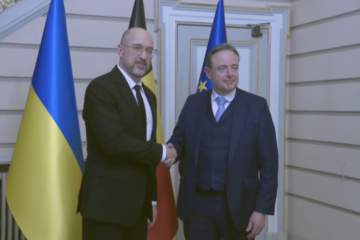This is more than just about economics. “Trump’s tariffs” will hit transatlantic unity and throw in doubt U.S. global dominance.
Ukrinform already wrote about the shockwaves of economic upheaval raised by Donald Trump’s escalating trade war. But the genuine storm they have caused is raging also across the political landscape, threatening to overturn the boat of the established world order. These tariffs have turned out to be not just trade barriers, but powerful geopolitical “charges” that would hit long-standing alliances hard, undercut strategic efforts to contain China, and highlight strange paradoxes in the attitude towards friends and foes. Read below about what is in the political lining of this storm, how it affects the fragile alliance between the United States and Europe and NATO; how it changes the dynamics of the U.S. confrontation with Beijing; what is the dubious logic behind Trump’s decision to punish Ukraine with 10% tariffs while leaving off Russia because U.S. sanctions already ” preclude any meaningful trade”, and how destructive this tariff policy can be for the global political posture of the United States itself.
TRANSATLANTIC RIFT AND A SHADOW OVER NATO
The closest US allies in Europe have come under direct attack from tariffs, which has become a serious test for transatlantic unity. Experts are unanimous in assessing the adverse impact from these measures.
Ihor Reiterovych, Director of Political and Legal Programs at the Ukrainian Center for Social Development, is straightforward in his assessment: “It is obvious that the impact will definitely be there, and it is unlikely to be positive, unfortunately. Many partner countries and allies of the United States perceive such moves as unfriendly, and sometimes completely unjustified. When Donald Trump tries to play protectionism in a globalized economy, it looks at least strange.” The expert describes in detail the inevitable consequences that will not take long to come: “Such actions inevitably lead to aggravation of relations, at least for a certain while. Other countries will be forced to reconsider their policies towards the US, and it is quite likely that we will witness fresh trade wars. And this, in turn, will have political consequences – statements, accusations, diplomatic tension” There is a risk that the economic conflict will negatively affect other areas of cooperation: “It is possible that this could also have a ricochet effect on transatlantic relations, in particular in the context of support for Ukraine. After all, despite Trump’s attempts to present tariffs as a purely economic measure, in a globalized world, politics and economics are closely intertwined.” At the same time, Mr Reiterovych does not rule out that this is Trump’s specific negotiating tactic: “We can assume that Trump is guided primarily by political motives. This is his strategic move: to create a conflict situation, and then exploit it as a bargaining leverage, like, let’s sit down at the negotiating table, and maybe we will lower the tariffs if you make concessions. This is a kind of business approach to alliances”.
Volodymyr Fesenko, Chairman of the Board at the Center for Applied Political Studies “Penta” comments: “This will definitely have an adverse impact on US relations with Europe, in particular with the EU. The critical response has already started pouring in from the EU.”
The expert notes that Europeans were to some extent prepared for such a turn of events: “There were already numerous signals of president Trump and people from his administration’s negative attitude towards Europe, towards the European Union. This includes the speech by US Vice President J.D. Vance at the Munich Security Conference in mid-February, and public statements by Elon Musk, and much more. The US trade war with the EU was also openly announced.”
Mr Fesenko emphasizes Trump’s pragmatism: “There is no need to be surprised. Trump has no friends when it comes to business and economics. Tariffs have been imposed, in particular, against Israel, despite the very close political relations between Trump and Netanyahu, and between the US and Israel.” Regarding NATO, the analyst draws a clear distinction: “With NATO, the story is a little bit different. It’s no longer about tariffs, but about defense spending… US Secretary of State Marco Rubio is currently working with the Europeans to calm down their concerns, saying that the US will not leave NATO, at least in the short term, but will demand from the Europeans to boost their defense budgets and take on their share of responsibility for European security. And this is actually rational. But what will happen next in relations between the US and NATO is anybody’s guess. Under Trump, different scenarios are possible. ” That is, transatlantic security is one thing, and trade interests are quite another.
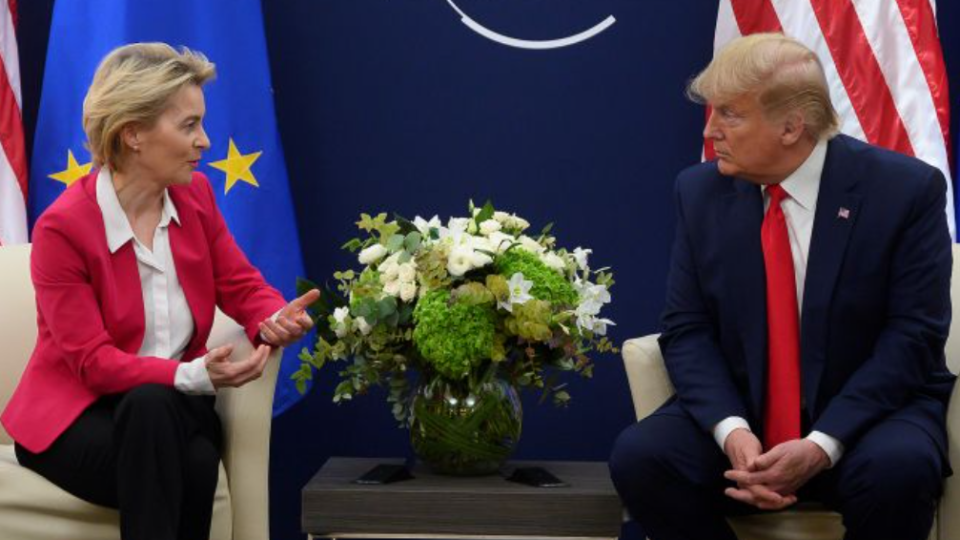
Petro Oleshchuk, a political scientist and associate professor at Taras Shevchenko National University of Kyiv, emphasizes the destructive effect Trump’s “tariffs” policy will have on the unity of the West: “After all, not only geopolitical rivals of the US have been affected, but also its long-established partners and allies. In this way, the unity of the West is simply being demolished.” The expert suggests that this can signify the beginning of a global conflict: “Trump’s decision to impose tariffs has already met with an extremely negative reaction from the European Union and other United States’ partners, because this actually indicates the start of a major trade war, which will inevitably entail increased tension, above all else between the United States and its traditional partners.”
Mr Oleshchuk makes a grim forecast: “Trump continues to undermine the Western unity as well as the US global dominance… this makes the collapse of the established world order and the fragmentation of the world inevitable. Major alliances and unions are breaking down, and, obviously, we are in for a complete reset of international relations, a reorientation of states from one partner to another. And this all makes the further development of events difficult to predict. The expert concludes that the very principle of division into the West and Anti-West is collapsing: “From now on, there will be states that will form situational alliances. But no one will count on the United States a strategic partner anymore.”
THE CHINESE FRONT: RIVALRY IS GETTING WORSE
Trump’s tariff attack brings the confrontation between Washington and Beijing to a new level, the consequences of which will reverberate across the whole world and will lead to retaliatory protectionism affecting all aspects of trade.
Ihor Reiterovych analyzes the situation for China as twofold: “China will most likely try to bolster its posture as a global leader, especially in the Global South. After all, these countries have become the main “targets” for trade pressure from the US, and, reasonably enough, they will be looking for alternatives. And here China has every chance to offer itself as a stable and predictable partner.” On the other hand, China will not leave the US actions without a retaliation. “It is crucial for China to maintain the image of a strong actor that does not give in under pressure. Therefore, the retaliation will most likely be reciprocal (at the time of publishing, Beijing was reported to have imposed a 34% tariff on all imports from the United States – ed.)”. As a result, the expert predicts, the competition will change its focus: “And the next phase of the competition between the US and China, at least for a certain time, will move to the domain of the struggle for influence on third countries. This is, in particular, about where exactly the businesses and production capacities being withdrawn from the tariff-affected markets will be relocated. And where exactly the two great powers will look for new markets”.
Volodymyr Fesenko provides his comment: “A trade war is beginning between the United States and China, but there is a high probability there will be attempts made to negotiate and achieve compromises of some kind and so avoid a break-up. Trump, quite remarkably, is using the tariff war as a tool to force countries into negotiations on terms that are favorable to him. China, too, however, is very well familiar with these games. “What is fundamental here, the expert suggests, is Washington’s awareness of Beijing’s role: “The full-scale confrontation between the United States and China is just getting started.”
Mr Fesenko highlights the significance of this confrontation for Ukraine: “We will have to take this into account while reconsidering our relations with the US, as well as US relations with Russia. The decisive factor that will further determine Ukraine’s relations with China will be Beijing’s posture on Russia’s war in Ukraine, and how relations between Kyiv and Washington will be changing.”
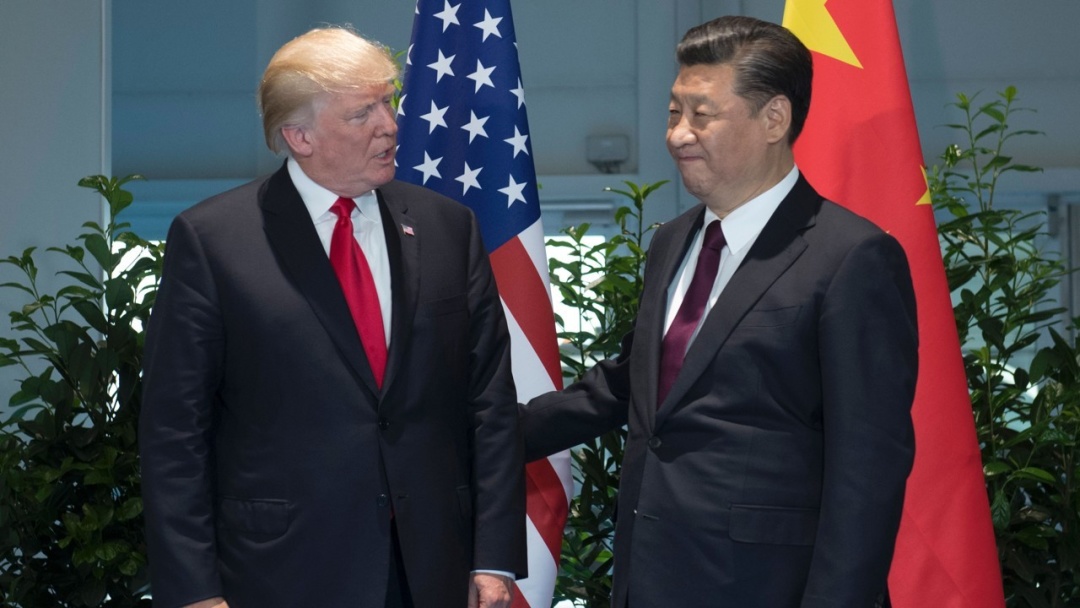
Politics analyst Serhiy Taran points to a broader issue: “The biggest issue with ‘Trump’s tariffs’ is not about someone’s economic losses, but the demolition of long-established political and security alliances and, in general, the low predictability of world politics. Times of turbulence are always associated with new wars and panicked expectations. Rules, previous calculations and red lines have simply lost their meaning.”
As an interesting note, this destabilization can lead to the emergence of surprising tactical alliances: “Unexpected alliances can be created, like, for example, coordinated actions by Japan, South Korea and China – previously eternal competitors, and sometimes even enemies – to collaboratively protect themselves against US tariff policy. And this is just the beginning.” Mr Taran also believes that this US policy, in point of fact, plays into Beijing’s hands: “I think that the White House actions provide a good chance for China to strengthen its influence on other regions, Europe in particular.”
UKRAINIAN PARADOX AND RUSSIA’S EXCLUSION FROM TRUMP’S LIST OF TARIFFS
The situation surrounding Ukraine and Russia has become particularly reverberating in the context of Trump’s tariff policy. Kyiv, which is fending off Russia’s war of aggression and needs the support from the West, was imposed a minimum basic tariff of 10%. That being said, Russia, the aggressor country that is under numerous sanctions, surprisingly found itself off the list.
Regarding the tariff imposed on Ukraine, Volodymyr Fesenko comments: “It’s no disaster. This will create certain difficulties for Ukraine’s metallurgical sector, for some other Ukrainian businesses that used to export their products to the US. But the tariff rate imposed on us is the minimum basic. Therefore, we will not lose in competition with other countries.”
Moreover, Ihor Reiterovych sees in global trade wars a certain “window of opportunity” for Ukraine, which can become an attractive platform for investors: “Firstly, we are a country with highly skilled labor… Secondly, Ukraine, despite the war ongoing, retains a relatively large domestic market and a sufficiently high level of purchasing power… Thirdly, Ukraine has a raw materials base, which is currently extremely valuable… And not only do we have the potential for rare earth production development and exploration, but also huge resources related to food.” These advantages, if implemented to the full, can turn Ukraine into a “vibrant actor in the emerging global configuration.” But this, however, will take a certain amount of effort: “The main question is whether we will be able to bring these opportunities to bear. The ongoing war remains a key limiting factor, of course. And it is therefore vital that the Ukrainian government is proactive now in addressing the emerging challenges”.
Serhiy Taran continues to note: “In the tariff war, Ukraine has found itself in a better position. Because we have been in a real-world war for a long while now, and we have learned how to become accustomed to many things. And the rest of the world still has everything ahead of it.” However, there is also a negative side to this experience unfortunately: “The obviously bad story here is that the global war of tariffs will reduce interest in the war in Ukraine – everyone will now have enough of their own problems to worry about.”
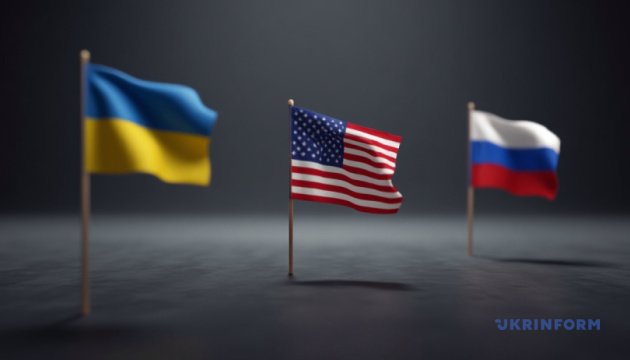
The situation with Russia looks much less logical if we proceed from political declarations. Ihor Reiterovych questions the US official explanation that Russia was left off because U.S. sanctions already “preclude any meaningful trade. “As a matter of fact, the US Treasury Secretary is being deceitful. Trade turnover between the US and Russia currently amounts to approximately $3 billion… But it exists – and that is a fact.” The expert offers a political interpretation: perhaps the US considers the existing sanctions are already tough, or it is “a kind of demonstrative “gesture of goodwill”, like, we can leave a window open for dialogue… if the other side behaves appropriately”. Mr Reiterovych views this as a manifestation of Trump’s signature policy of “carrot and stick”: “On the one hand, tough tariff initiatives… On the other hand, certain “relaxations” or simply the abandonment of fresh restrictions… This is a kind of message… America is opening a “window of opportunity” for Moscow. And now everything depends on how exactly the Russians will avail of this chance.”
Volodymyr Fesenko calls the situation “paradoxical,” saying that the value of U.S.-Russia trade amounted to $3.5 billion as of last year. He is inclined to explain Russia being exempt from Trump’s list of tariffs on US trade partners by “pragmatic-prosaic and to some extent lobbyist” considerations: “Russian exports to the US are comprised largely of fertilizers, palladium and nuclear fuel. And it is simply not profitable for the US to impose tariffs on these imports. Nothing personal or political, just business.” That being said, the analyst admits that “conspiracy theories about this being connected to ceasefire negotiations with Russia will continue to circulate.” The White House is playing a “special game” with the Kremlin, the analyst suggests, drawing an analogy with Cuba, Belarus and North Korea – the countries also not included because existing tariffs and sanctions on them are already high.
TRUMP’S STRATEGY: CHAOS AS A TOOL OR A MISTAKE?
What is the ultimate goal behind this tariff storm? Does Trump have a long-term strategy, or are these just situational decisions? Experts offer different explanations, but agree that this harbors serious risks and negative consequences for everyone.
Ihor Reiterovych points to the inevitable negative consequences this may entail for the United States itself in the short and medium term: “This is an objective reality – the burden of the new tariffs will be passed on to the shoulders of grassroot Americans. Because prices will inflate, causing the purchasing power to decline.” As for the motives behind Donald Trump’s “tariff war”, the analyst is considering a scenario involving this as an attempt to create a “controllable chaos” in anticipation of an imminent global crisis, but is more inclined to view this such that “Donald Trump is more of an emotional and impulsive player.” The expert quotes Governor Walts: “Trump thinks in terms of the economy of the 1980s… But in the 21st century, global markets are working by whole different rules.” Another possible explanation is the beginning of the “grand bargaining.” Regarding the US reputation, it will “certainly suffer”, but “Trump does not perceive it as an issue, but, following Don Corleone’s logic, as “a demonstration of strength followed by an ‘offer that cannot be refused’”.
Volodymyr Fesenko, for his part, suggests that Trump sincerely believes in the “miraculous effect of using tariffs as a weapon” and expects to raise “hundreds of billions, even a trillion dollars” for the US budget. However, the analyst recalls the U.S. Great Depression of 1930-33. “The Smoot-Hawley Act had a devastating impact on the global economy at that time… it led to a sharp reduction in international trade… The Great Recession only intensified in the US and in those countries that were economically connected to the US”. Based on this historical experience, Mr Fesenko is foreseeing serious risks facing the global economy today: “With a high probability, we can expect that the Trump induced “tariff shock” will provoke a global economic tsunami, and this destructive wave will inevitably return to the United States. There is a great risk of a sharp increase in prices for imported goods in the United States… the collapse of lots of trade and technological chains.”
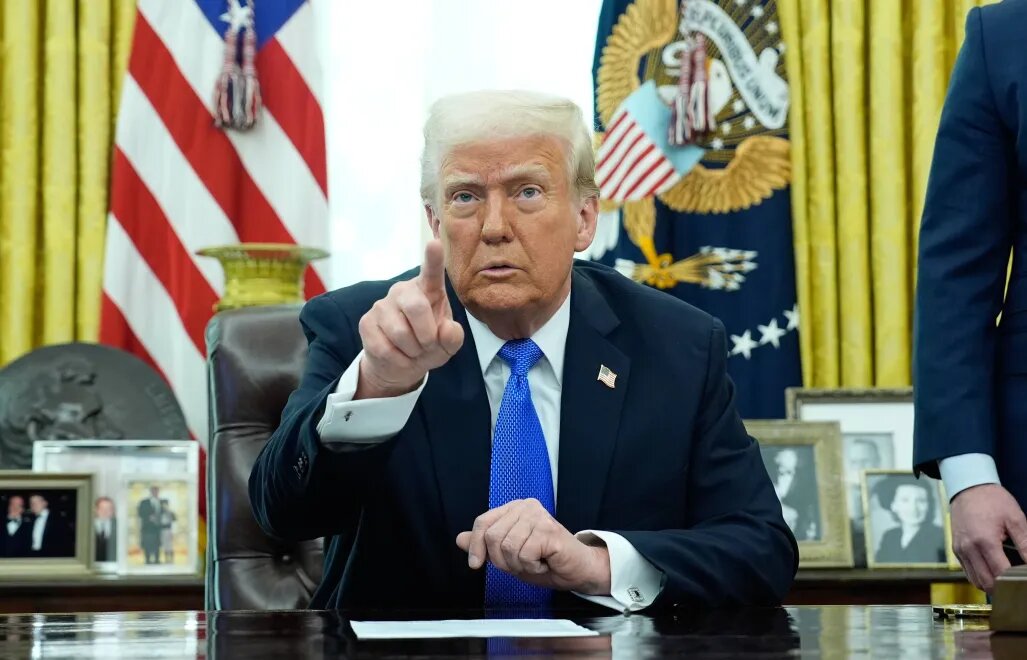
Petro Oleshchuk believes that, even global economic considerations aside, “the political implications of Trump’s decision to kick off a global trade war alone will be enough to bring a negative result.” The analyst is convinced that “Trump’s ‘simple decisions’ are unlikely to lead the US to anything good.” The main consequence, in his opinion, is a rapid deterioration of the US global leadership. “The United States is rapidly losing leadership in the Western world and influence in the world as a whole… those times are over.” Mr Oleshchuk believes this process to be irreversible: “Even if the US president suddenly changes his mind, he will not be able to reverse the situation… this is an irreversible process, and no one will stop it… most likely, Trump’s decision is the last nail in the coffin of American leadership.”
Serhiy Taran sees Trump’s “strategic mistake” in his belief that “money can buy everything,” even to the detriment of political reputation: “The role the US has played in the world was based not just on the American economy, but more on its political status in the world. That is why the world chose the dollar as the foremost reserve currency. And now everything American will not inspire trust.” Initial signs of this are already visible: “Europe has been gradually abandoning purchases of particular weapons products from the United States, fearing that these weapons can be “disabled” without warning, and this is just the beginning.”
CONCLUSION NOTES
Trump’s tariff policy has become a catalyst for global transformation. Expert assessments suggest a deep crisis of trust, the demolition of established alliances, and increased unpredictability. Only time will tell whether this is a cunning strategy or an impulsive move. But it is clear even now that the world is entering a new, turbulent era, where the old rules no longer work, and the implications of the US policies can be irreversible for both the world order and the United States itself.
Myroslav Liskovych, Kyiv
Source: Trump’s tariff war: a political calculation or a precursor to the end of U.S. global dominance


